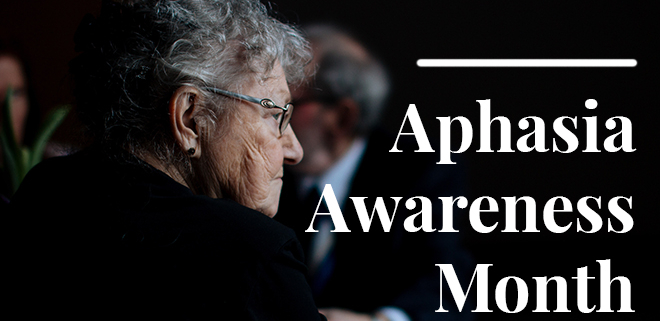Last week we learned about a patient who had Aphasia, and what it was like for him and his family. Each patient is different when it comes to rehabilitation, but every patient can benefit from a family member that is aware of their condition. Aphasia Awareness Month is the perfect time to learn more about this condition. When a patient experiences damage to the parts of the brain where language occurs, we call this “aphasia.” Aphasia can cause a person to lose their abilities to process language, be it in expression or comprehension. Most often, the left side of the brain is the one responsible for aphasia and causes the affected person to encounter difficulties with speech and comprehension.
Many of our aphasia patients are stroke survivors. Although things like brain tumors and traumatic brain injury can also be responsible, stroke is most-often the culprit for the language struggles that we help our patients work through.
Common symptoms of aphasia:
Patients with aphasia often display issues with both comprehension and expression.
When most of the problems lie in the comprehension or reception of language, this is often classified as “Wernicke’s Aphasia.” While a sufferer can sometimes pick up on the melody or cadence of a sentence (determining if it’s a command or question, for example), they might have problems understanding the specific words that are being said. Since a person’s vocabulary is housed in the left side of the brain, understanding of words can sometimes be affected, as well as the concept of stringing words together to form a full thought.
When the issues mostly lie in the survivor’s ability to express themselves, it usually falls under the category of “Broca’s Aphasia.” In this case, the symptoms are more outwardly visible, as the patient struggles greatly with speech and the construction of sentences. Aphasia, in this case, can present itself in a variety of ways. Sometimes a patient will create something that sounds like a sentence, but is comprised of gibberish-like words. Other times, they might be able to get out enough words to get an idea across, but leave out small connecting words like “the” or “and.” When all areas of language are hindered, it is referred to as “global aphasia.”
Support
The range of symptoms that can occur during aphasia is wide and varied, but the factor that stays constant is a need of support. Through the support of family members, friends, and rehabilitative therapists, a person suffering from aphasia has a better chance of getting back on the road to understanding and function.
What can you do?
The word “aphasia” can be intimidating. While it is definitely a serious condition, it is one that can be worked with and, to some degrees, overcome.
Recognize… that aphasia has not affected the patient’s intelligence. It has altered their ability to communicate and understand language, but their personality, memories, and knowledge remains. Remembering that the same person you’ve always known resides behind this communication disorder can be grounding and encouraging.
Take the time… to learn your suffering family member’s struggles and specific communicative needs. After a period of routine, you’ll be able to discern how to understand and communicate with your loved one, bringing a sense of comfort and progress to the both of you.
Create… an environment that is conducive to focus and treatment. When a person has difficulty understanding the simplest of words, even the simplest of distractions can be a deterrent to progress. Eliminate extra sounds and excessive visual stimulations, so that your loved one can focus on the task at hand. Simplifying your questions to yes/no and slowing down your rate of speech can encourage success.
Explore… different methods of therapy. Sometimes drawing, writing, and even the encouragement of socialization can stimulate progress in a stroke survivor’s language. It is important to keep communication with your loved one’s therapist open so that you can learn about techniques that may be specifically helpful to your situation.
We understand that recovery is a process that can take its toll on not only the patient but their support systems as well. To alleviate some of the pressure, we encourage you to seek help from rehabilitative professionals, Speech-language pathologists being an ideal option, to make this process as successful as possible.



